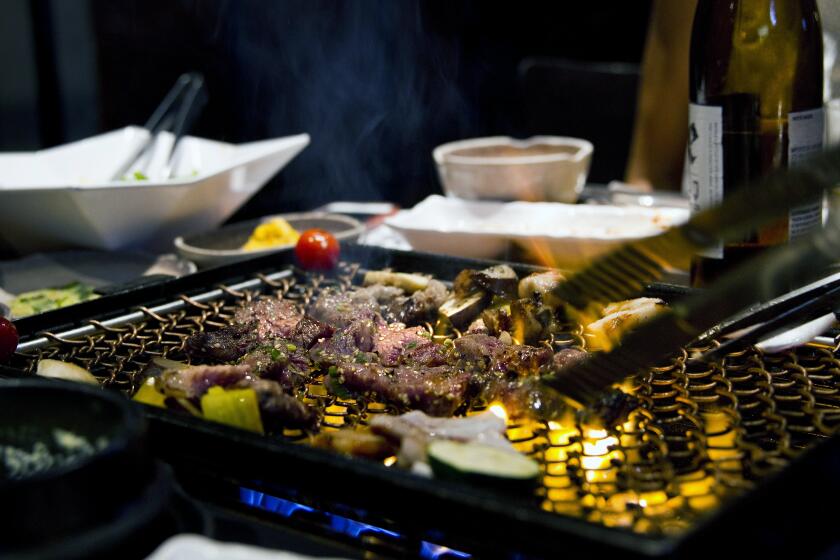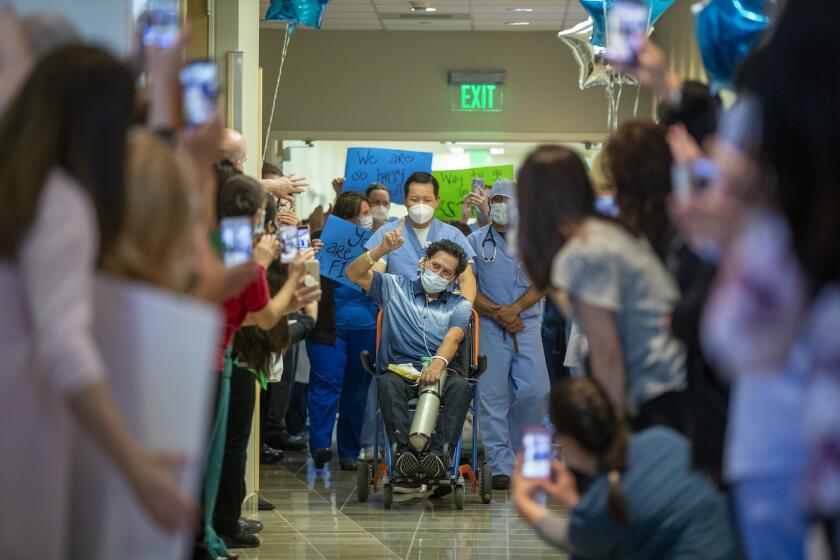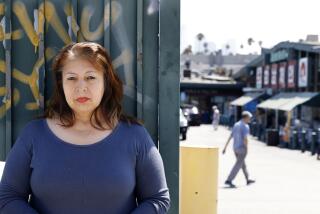Column: It’s natural to long for an end to the coronavirus quarantine. But we should remember what it has shown us

Last week, I caught up with one of the workers I met last year as I was reporting a column about labor violations at a Koreatown barbecue restaurant.
Anderson Casteñon was the cook who prepared meats, side dishes, sauces and salads at Genwa Korean Barbecue. The high-end restaurant, which is popular among celebrities, has locations in Beverly Hills, downtown Los Angeles and Hancock Park. Casteñon’s boss cut his hours but required him to do the same amount of work, all without bathroom or meal breaks.
I didn’t use his name or the name of the restaurant then because I wanted to protect him from retaliation, but now there’s nothing to protect. He was laid off at the end of February, along with most of the restaurant’s staff, because of a downturn in business related to coronavirus fears.
Columnist Frank Shyong takes a look at all the labor that goes into a single meal of Korean barbecue.
The California labor commissioner’s office cited Genwa in January for wage theft and other violations, ordering the restaurant to pay more than $2 million. The penalties are under appeal, so the stolen wages haven’t reached the workers they belong to. Jay Kwon, the owner of Genwa Korean Barbecue, did not respond to a request for comment.
The Koreatown Immigrant Workers Alliance, a nonprofit that helped Casteñon and his fellow workers bring their case to state labor authorities, gave him some money as part of a wage worker support program; but a few days ago, the money ran out.
He spent his last dollar on a pack of vitamins to send home to his family in Guatemala. He’s applying for a job at Numero Uno Market, but he hasn’t heard back. He had to ask his mother to help with this month’s rent on the studio he shares with three others.
These are some of the unusual new scenes across the Southland during the coronavirus outbreak.
“My biggest concern is that I cannot send money home,” Casteñon said.
Perhaps you think one story of hardship is insignificant because more than half of L.A. is out of work, and that restaurants need our support, not our criticism now. Why talk about labor violations amid a global crisis?
Our current crisis is not just a pandemic, but also a human-made disaster of all the things we’ve grown accustomed to overlooking. Even an unknown virus doesn’t pose an existential threat to any country with a modern healthcare system that has the full cooperation of a government that trusts science and cares about the lives of its people.
The last two months have been a painful reminder that we don’t live in a country like that. The way America has responded to the coronavirus is a disaster of its own kind.
The PPP was supposed to save our small restaurants and businesses. But where’s the money?
Food rots in the field as food banks struggle to meet demand. An emergency aid program meant for small businesses was monopolized by wealthier chains that had better relationships with banks. Grocery stores and delivery services, seeing record profits, pay their workers pennies without providing enough sick leave or protective equipment.
Asian Americans are being blamed for the virus and targeted for hate crimes. Black and Latino people are dying from COVID-19 at disproportionately high rates. And all around the country, our poorest workers must choose between letting their families go hungry or putting their lives at risk.
You can’t blame a virus for these consequences any more than you can blame the bullets in the gun for a shooter’s actions. A society that can’t protect its most vulnerable citizens cannot effectively fight an outbreak.
Poverty — and the crowded housing conditions, poor health and lack of access to healthcare that come along with it — makes us far more vulnerable to disease. Exploited, underpaid wage workers without access to proper healthcare cannot continue to perform the essential functions we need. Inequality endangers us, especially now.
This pandemic hasn’t just revealed these cracks in our social contract — it has turned them to vast chasms that threaten to swallow entire industries, communities and neighborhoods.
There has never been a starker dividing line than the one between those who are forced to risk infection to survive and those who can afford to avoid it. Never has there been a more powerful illustration of class inequity than our new work-from-home society, where we sit in our homes shaming people for leaving the house, all while summoning poorer people to leave their homes via smartphone apps so they can bring us food and Amazon packages. At my local grocery store, we wear masks to browse produce picked by workers who can’t afford or find protection of their own.
A lot of us seem eager to move on from this pandemic, and that’s a natural feeling. But I hope that we never forget what it has shown us.
More to Read
Sign up for Essential California
The most important California stories and recommendations in your inbox every morning.
You may occasionally receive promotional content from the Los Angeles Times.














